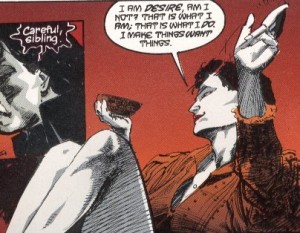“She would have bound me to her with ropes and had us lie face to face unable to move but move on each other, unable to feel but feel each other. She would have deprived us of all senses bar the sense of touch and smell. In a blind, deaf and dumb world we could conclude our passion infinitely. To end would be to begin again” (Winterson 162).
During this part of the novel, Louise is asking the narrator of her loyalty to her. The narrator then muses about all the things Louise would do to keep them together. There are repetitive phrases in the passage, but most importantly is the phrase—repeated twice, “She would have” (Winterson 162). This set of words portrays Louise as the active party, and with the descriptive actions that come after each phrase, portrays the narrator as the passive party. This may be the narrator attempting to prove to readers that Louise would go further than they would to keep them together, as a defense for their affair altogether. However, this active versus passive language also seems somewhat accusatory. In many marital affairs, the outside party is often blamed more than the married person. Here, the narrator makes it seem as though Louise chased them, as though the narrator is helpless because Louise “bound me to her with ropes” (Winterson 162). This part especially depicts Louise as an almost villain, as someone who ties people up so she may have her way with them. In this passage, Louise appears to take something away from herself and the narrator, but this absence adds something to their relationship. First, she takes away the ability to move away from each other. But the narrator adds that they would be “unable to feel but feel each other” (Winterson 162). The narrator continues, and after stating Louise “would have deprived us of all senses but bar the sense of touch and smell” (Winterson 162), states “In a blind, deaf and dumb world we could conclude our passion infinitely” (Winterson 162). This gives readers the idea that although Louise would strip herself and the narrator of different abilities, that they would still be able to enjoy their relationship in a different way, as though their relationship could evolve during any challenge. The narrator goes on to describe the world Louise would create if she “deprived us of all senses bare the sense of touch and smell” (Winterson 162). This part made me think of what it would be like to be buried as a corpse—what it would be like to be dead. The narrator may be making a small hint at Louise’s possibly fatal illness, especially when they say, “To end would be to begin again” (Winterson 162). The end of the passage seems to refer to the novel as a whole, to the issue of their affair and it’s seeming end as a whole. The narrator appears to almost be saying that dying may relieve all of the pain they and Louise are experiencing, that even in death their relationship could go on.
